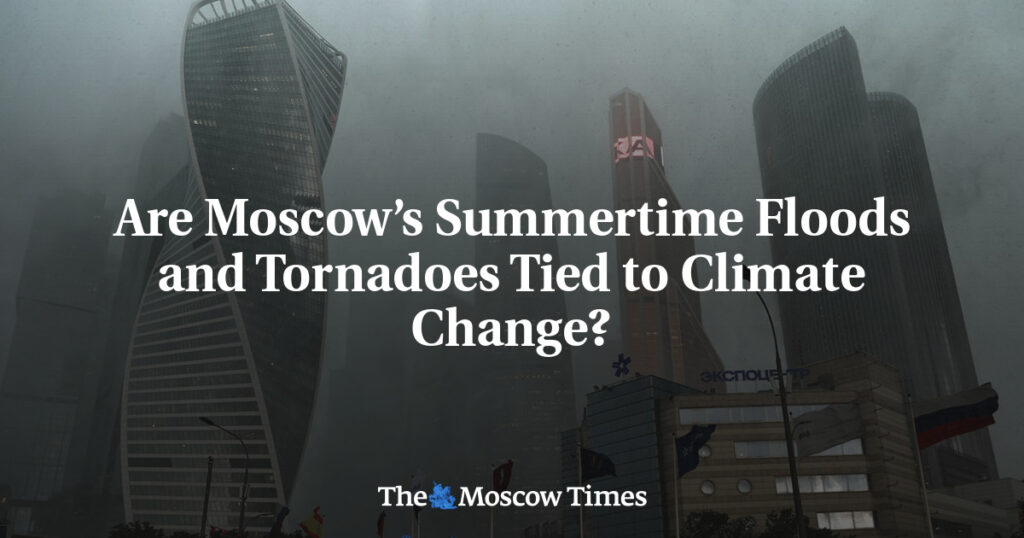Moscow Faces Tornado and Flooding Amidst Growing Climate Concerns
Moscow Mayor Sergei Sobyanin recently issued a rare and alarming warning: a tornado was predicted to hit the Russian capital. On June 19, he took to Telegram to alert residents: “Tomorrow, we will face another challenge with extreme weather conditions. There is a chance of tornado formation, which is particularly dangerous. Please be careful and avoid being outside.”
As predicted, the very next day, the powerful storm Edgar lashed Moscow, producing a tornado in the region. The storm caused devastating damage, uprooting trees, and even sending pedestrians flying. Tragically, two lives were lost, and 35 people were injured, some from falling trees. One individual was notably trapped in a portable toilet that had toppled over. This incident struck just one week after parts of Moscow were submerged by consecutive days of unusually heavy rain.
The Climate Context
The storm and subsequent flooding highlight a troubling trend: as human activities drive global warming, extreme weather events are increasingly frequent and severe, especially in densely populated urban areas like Moscow. Last year was the warmest year on record for European Russia, including Moscow. Data show that the capital has warmed by about 2.4 degrees Celsius from 1780 to 2020, compared to the global increase of 1.4 degrees Celsius above pre-industrial levels as of 2023.
Temperature and precipitation records are frequently broken in Moscow. Some scientists propose that the city’s traditional temperate continental climate could shift to a wet subtropical climate later this century, featuring mild winters and more intense rain showers.
The Mechanics of Tornado Formation
Tornadoes require specific atmospheric conditions: a combination of warm air, moderate latitudes, and a large continental expanse. According to Vladimir Semyonov, deputy director at the Obukhov Institute of Atmospheric Physics, tornadoes often occur in Moscow when warm, humid air—which is becoming more prevalent during the summer—cools rapidly as cold air from the Arctic arrives.
Tornadoes in Russia: How Common?
While tornadoes do occur in Russia, they are mostly weak and short-lived. The country experiences between 100 and 300 tornadoes annually, with 10 to 50 being severe. These events typically injure 50 to 100 people and result in five to ten fatalities each year. Notable tornado occurrences include one that passed through Ivanovo in 1984 and another that struck the Moscow region in 2016, both resulting in casualties.
Rising Tornado Frequency and Intense Downpours
Experts like climatologist Alexander Chernokulsky from the Obukhov Institute note an increase in tornadoes and severe squalls in central Russia, alongside the Black Sea coast and southern Western Siberia. While human-caused climate change is suspected to create conditions favorable for tornado formation, researchers are cautious about directly linking the increased frequency of tornadoes to global warming.
However, Moscow has undoubtedly seen higher annual precipitation from 2014 to 2023 compared with the period from 1950 to 1979. Heavy showers, replacing the continuous rains typical of the 1970s, have become more frequent, intensifying the urban flooding issue.
Preparing for Future Challenges
The increasing occurrence of tornadoes and heavy rainfall poses significant challenges. According to Chernokulsky, the negative impacts will largely depend on the effectiveness of forecasting and early warning systems. Accurate disaster predictions require advanced radars, satellite monitoring, and sophisticated computer models to ensure public safety.
Though Moscow boasts the most developed stormwater drainage system in Russia, recent storms have exposed its limits. Current "near-tropical" showers exceed the capacity of the city’s drainage infrastructure, pointing to an urgent need for upgrades.
As extreme weather events become more frequent, cities like Moscow must prepare to adapt their infrastructure and emergency response systems to mitigate these growing threats. Effective planning and international cooperation will be crucial to building resilient urban environments in the face of climate change.
For more information on Moscow’s weather and climate adaptation strategies, visit the Moscow Government’s official website.
